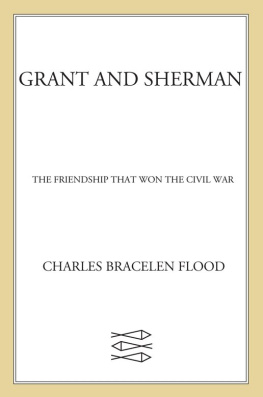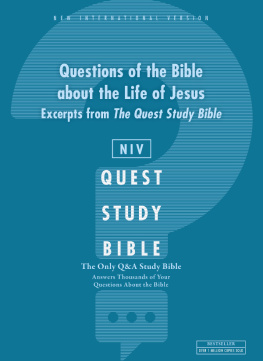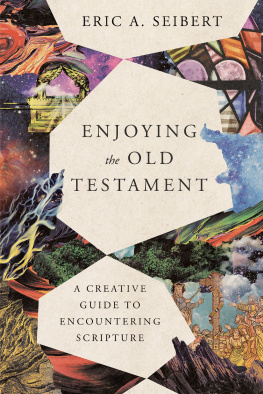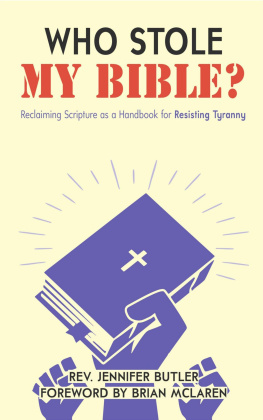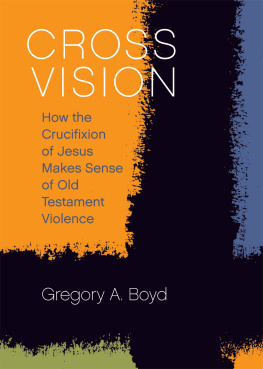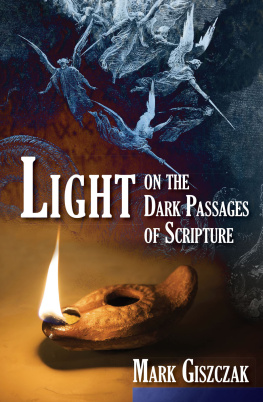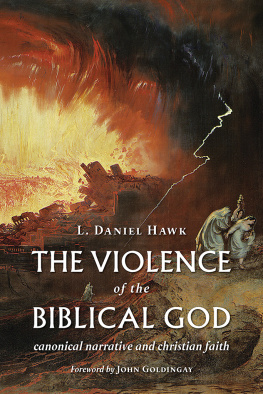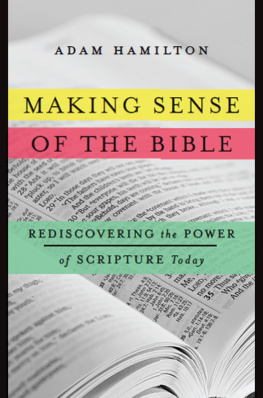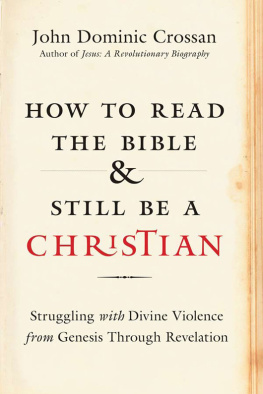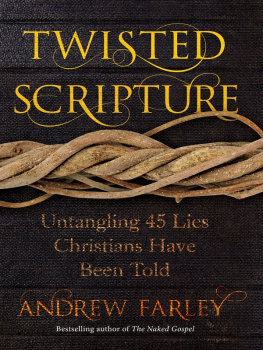Chapter 1
Confronting Violence in Scripture
Christians have long sought to reconcile the loving God they encounter in the New Testament with the violent and angry depictions of God found in the pages of the Old Testament. On the one hand, Jesus tells us to love our enemies and pray for those who persecute us (Matthew 5:44). On the other hand, we read in the law of Moses the divine command for God's people to show them no mercy (Deut 7:2) and kill everything that breathes (Deut 20:16). While it may be hard for us to face, such glaring contrasts found within the canon of Scripture are hard to overlook.
Does the Bible describe a God of love or a God of genocide? How are we to reconcile that the apparent answer to this question is that it describes both? A s people of faith we need to face the sobering fact that some parts of our Bible command us to love our enemies, while other parts command mercilessly slaughtering them.
Understandably, this presents a crisis of faith for those of us who regard the Bible as being normative for our liveswho see the Bible as being our own sacred scripture. How are we to make sense of this? If the Bible is Gods Word, how can it present such starkly contrasting visions of who God is, and what faithfulness to God entails? What effect does this have on our ability to trust and love God? How does it affect how we see and treat others when such violent passages are meditated upon and internalized as Holy Scripture?
These are obviously not questions that can be sufficiently addressed from an intellectual perspective alonewhether that means the detached perspectives of liberal biblical scholarship or conservative apologetics. These are issues that cut to the heart, that impact our lives in profound ways, and that can have devastating consequences.
The approach taken in this book will therefore be to attempt to honestly wrestle with these questions from a perspective of faith, with the ultimate goal of understanding how Jesus reading of Scripture led him to a message of radical forgiveness and enemy love, and how adopting his way of reading Scripture can allow us to faithfully confront religious violence as well, rather than seeking either to justify it or explain it away.
The first step in that journey is to begin by taking a long and sobering look at the extent to which human violence is not merely described in the Bible, but actively promoted as Gods will. This is not simply a matter of a few troublesome passages. Violence and bloodshed committed in Gods name is a major theme of the Old Testament.
The Old Testament records that the Israelites were commanded by God to kill every man, woman, and child in the neighboring nations. Entering into the promised land is a story of mass genocide, described in terms of a holy war. Break down their altars, smash their pillars, hew down their sacred poles, and burn their idols with fire. For you are a people holy to the Lord your God. You shall devour all the peoples that the Lord your God is giving over to you, showing them no pity (Deut 7:56, 16).
Elsewhere in the Old Testament holiness is characterized by compassion and mercy. Here however the opposite is the case: Holiness is not understood here in terms of goodness and mercy. On the contrary, it is characterized by a refusal of mercybeing holy here entails mercilessly committing genocide in Gods name.
We are faced here with two very different understandings of who God is, two diametrically opposed understandings of what holiness looks like. On the one hand, we have a God of mercy and love, and on the other we encounter a God of war. In fact, one of the most frequent names for God in the Old Testament, occurring 235 times, is the Lord of Hosts, which literally means God of Armies in Hebrew. As Moses declares, Yahweh is a warrior; Yahweh is his name (Exodus 15:3).
What biblical scholars refer to as the genocide narrative is a central theme of the books of both Deuteronomy and Joshua, and constitutes a major component of the defining story of the Israelites as they came into the promised land. However, such violence is by no means confined to these books . The prophets seem to delight in imagining in disturbing detail the horror that such conquests would have entailed: Their little ones will be dashed to the ground, their pregnant women ripped open (Hosea 13:16).
Elsewhere, God is repeatedly portrayed as causing parents to cannibalize their own children (Lev 26:29; Jer 19:9; Lam 2:20; Ezek 5:10; Isa 49:2526). The graphic imagery in these passages is obviously intended to instill appalling fear in a violent God who is either on your side as you kill in his name, or who will inflict the most violent and humiliating suffering on you if you disobey. As the prophet Jeremiah writes:
You may ask yourself, Why is all this happening to me? Because of your many sins! That is why you have been stripped and raped by invading armies This is your allotment, the portion I have assigned to you, says the Lord , For you have forgotten me, putting your trust in false gods. I myself will strip you and expose you to shame! (Jer 13:22, 25, NLT).
Genocide, infanticide, cannibalism, and rape are all attributed to God in the Old Testament. For those of us who see the Bible as Gods word, this presents a profound problem: How can we say that the Bible is inspired when it seems to approve of, and even command things that we would in any other context clearly regard as being profoundly immoral?
In his compelling study of violence in the Bible, the late Swiss Roman Catholic priest and theologian Raymund Schwager writes that, Approximately one thousand passages speak of Yahwehs blazing anger, of his punishment by death and destruction, and how like a consuming fire he passes judgment, takes revenge, and threatens annihilation No other topic is as often mentioned as Gods bloody works.
In other words, at issue is not simply what God does, but what humans do in Gods name. Again, this is by no means a peripheral theme. As Schwager so powerfully illustrates, religiously justified violence is an unavoidable and central theme of the Hebrew Bible. Consider, for example, these two verses:
This is what the Lord Almighty says ... attack the Amalekites ... Do not spare them; put to death men and women, children and infants (1 Samuel 15:2-3).
O daughter Babylon ... Blessed is the one who seizes your infants and dashes them against the rocks! (Psalm 137:8-9).
Note that these passages are not simply about God judging people. If they were, then we might perhaps argue that God alone has the right to give life and to take it. Here, however, humans are explicitly commanded to kill little children in Gods name in 1 Samuel 15, and such acts are said to have Gods blessing in Psalm 137.
Likewise, these verses are not simply a record of human atrocity. Again, if they were, we could then perhaps claim that this was a record of human sin, recorded in the Bible as a sober re minder to us. No, these passages are calling for people to kill other people in God's nameto kill toddlers, in fact. In the first verse it is stated as a direct command of God to commit genocide. In the second it is celebrated as having Gods blessing to kill little children of an enemy nation as an act of revenge.
A Legacy of Violence
How can we, as Christians, reconcile deeply disturbing passages like these with the God revealed in Jesus who commands us to love our enemies? How can we reconcile the love of God we have come to know in our own lives personally with this brutal and terrifying picture of God recorded in Scripture? These are extremely difficult questions. What makes these questions all the more pertinent is Christianitys long history of violence.



